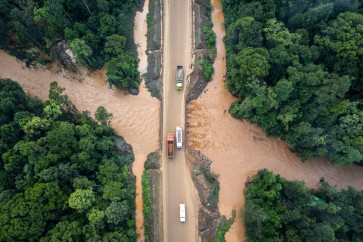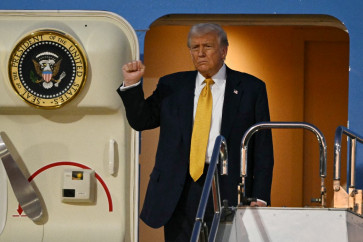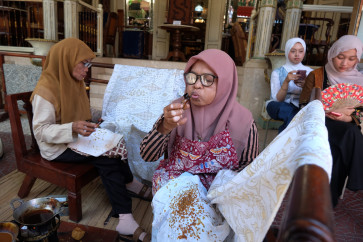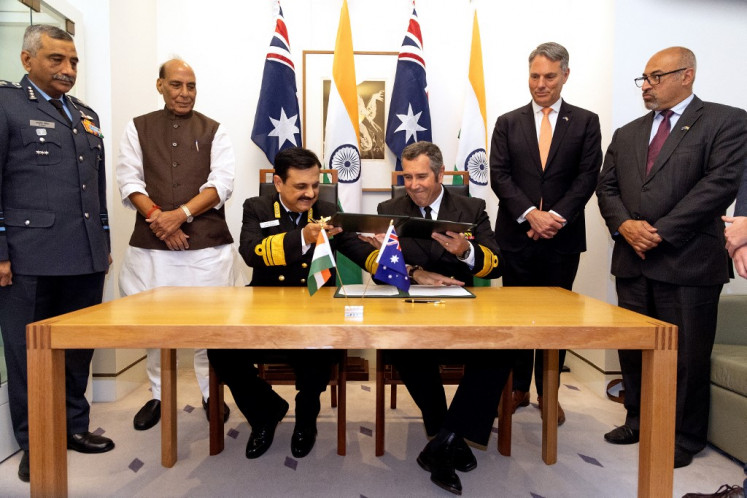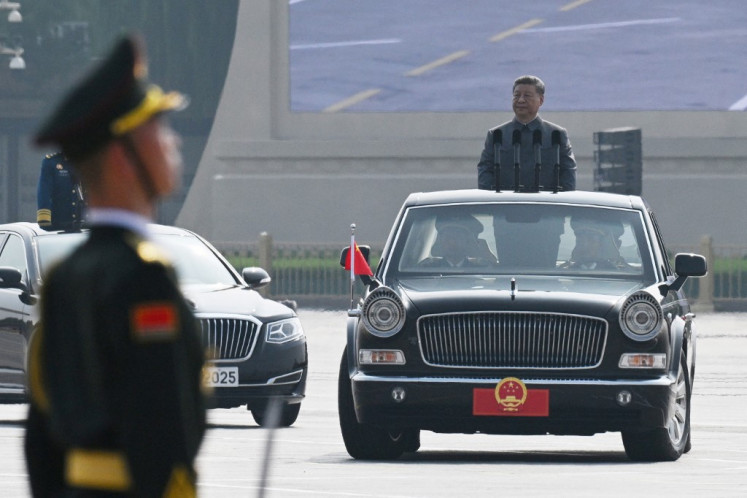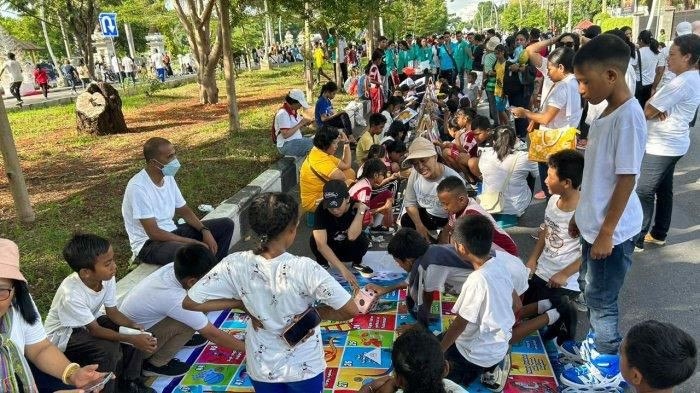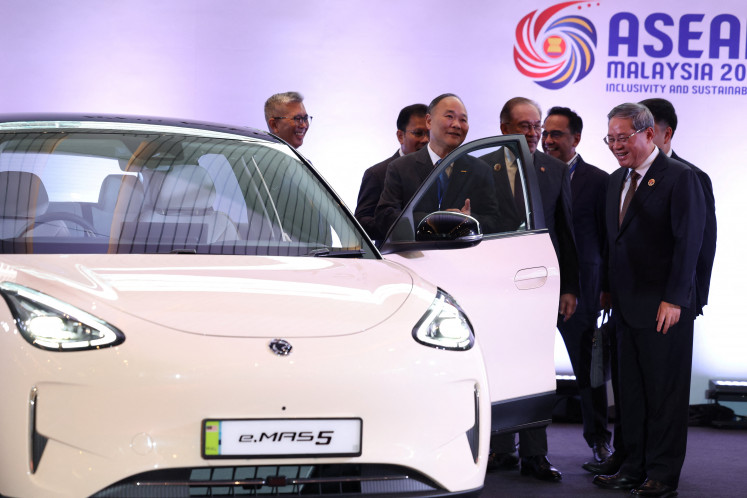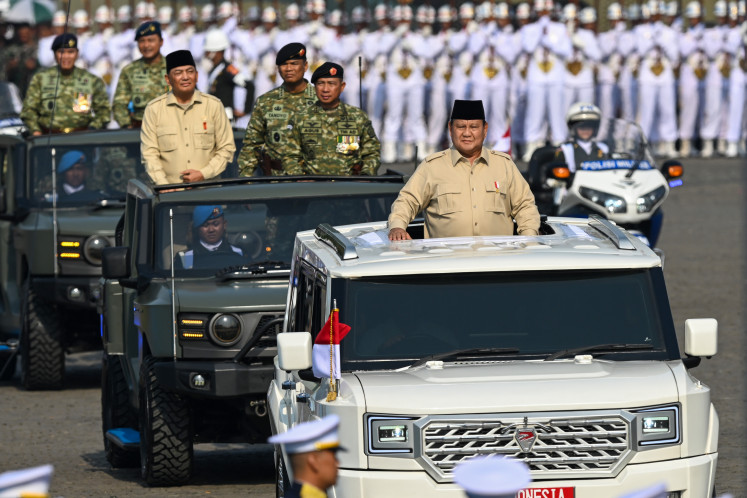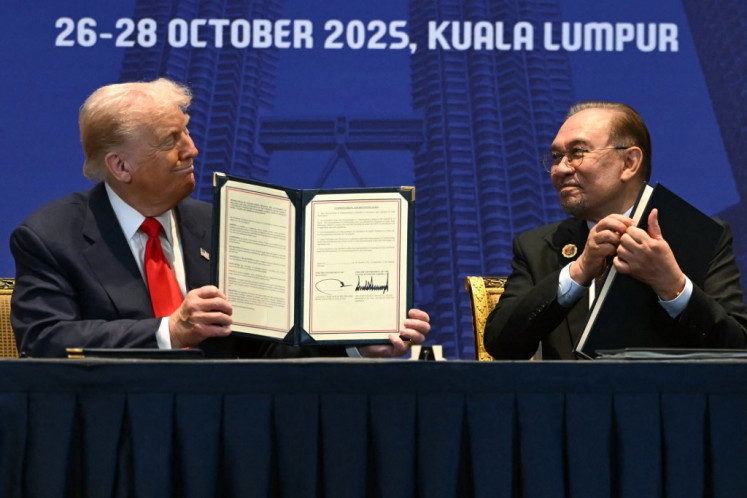Popular Reads
Top Results
Can't find what you're looking for?
View all search resultsPopular Reads
Top Results
Can't find what you're looking for?
View all search resultsOut of sudden, EU, ASEAN plan leaders’ summit in December
An EU official has confirmed that security issues would top the agenda as Brussels seeks a clearer stance from ASEAN members regarding Russia's invasion of Ukraine.
Change text size
Gift Premium Articles
to Anyone
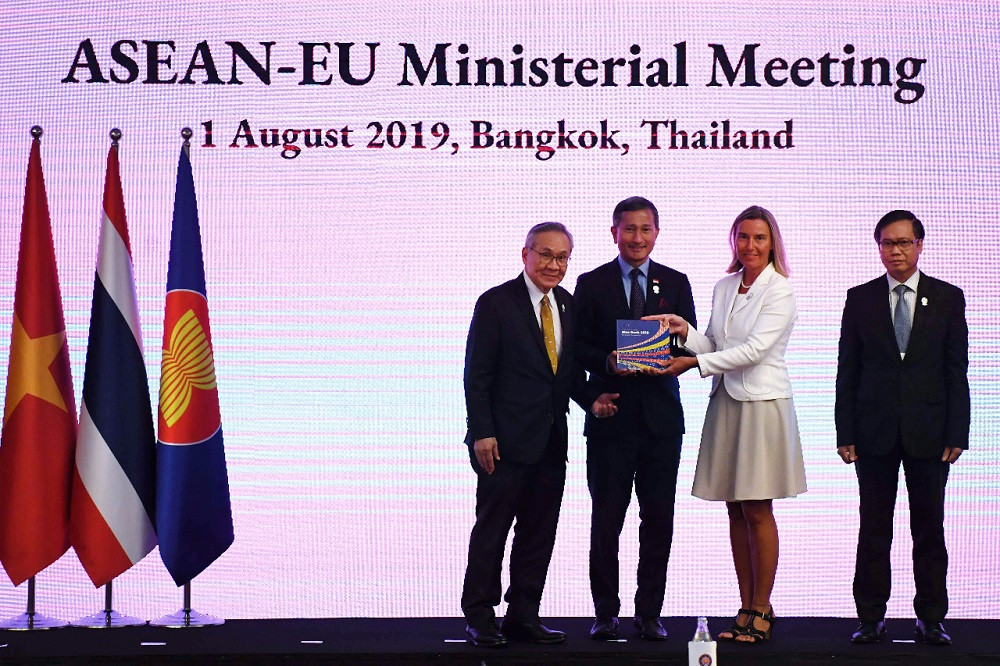 Stick together: The European Union’s foreign policy chief Federica Mogherini (second right) poses for a photo with Thailand's Foreign Minister Don Pramudwinai (left) and Singapore's Foreign Minister Vivian Balakrishnan (second left) during the ASEAN-EU Ministerial Meeting in Bangkok on Aug. 1, 2019. (AFP/Lillian Suwanrumpha)
Stick together: The European Union’s foreign policy chief Federica Mogherini (second right) poses for a photo with Thailand's Foreign Minister Don Pramudwinai (left) and Singapore's Foreign Minister Vivian Balakrishnan (second left) during the ASEAN-EU Ministerial Meeting in Bangkok on Aug. 1, 2019. (AFP/Lillian Suwanrumpha)
T
he 27-member European Union will host a full summit with the 10-strong ASEAN in Brussels on Dec. 14 to celebrate the 45th anniversary of relations between the two regional trade blocs. The EU is known for its preaching on human rights, democracy, freedoms and the environment, but this time around, the group will have to behave itself because of the changing international security and economic architecture.
For years, the EU has threatened to boycott palm oil products from Indonesia, which controls 85 percent of the world's production along with Malaysia. It has also often said bad things about coal, which is damaging to the global environment. Can it rigidly stick to its pride as a champion of democracy and the environment?
It is now losing its privilege of dictating the people of Southeast Asia on good governance. It has threatened to stop extending development grants or loans, although much of the money will return to the bloc.
EU needs ASEAN more than the other way around now that it faces China and Russia, which are ready to “swallow” its members.
President Joko “Jokowi” Widodo will have relinquished his Group of 20 presidency before the Brussels meeting but will take over the rotary ASEAN chair post and, therefore, he has to demonstrate his leadership of the regional bloc. In fact, he is the leader of ASEAN’s largest member in terms of economy, population and territory.
However, President Jokowi should remember the summit is not only about Indonesia but all of ASEAN. Efforts to immediately end the protracted crisis in Myanmar, for example, should be tabled in the summit.
An EU official has confirmed that security issues would top the agenda as Brussels seeks a clearer stance from ASEAN members regarding Russia's invasion of Ukraine.
Just after invading Ukraine, Russian President Vladimir Putin threatened to take more military actions, if necessary, by using nuclear weapons, while China is becoming more assertive. A weaker United States under Joe Biden, as well as Donald Trump, has forced the EU to find more allies, believing in the old saying “the enemy of your enemy is my friend”.
For the EU, the logical allies include the 10-member ASEAN, because four of its members — Malaysia, Brunei, Vietnam and the Philippines – have overlapping claims over the South China Sea, nearly the whole of which is claimed by China.
Although Indonesia is not a claimant, it has been increasingly annoyed by China’s nine-dash line map, which includes the Natuna waters as its traditional fishing ground for centuries. The United Nations Convention of the Law of the Sea (UNCLOS) recognizes Indonesia’s sovereign right to explore the 12-mile Exclusive Economic Zone (EEZ) in the Natuna waters.
According to Reuters, the EU is seeking to boost its clout in the region amid growing concerns there about China and the impact of Beijing's tension with Washington.
"When it comes to hedging against the US-China rivalry, the EU is always the very top answer in the region," said an EU official who is directly involved in talks with ASEAN nations.
European giants such as France and Germany are now boosting their participation in the Indo-Pacific framework. Like the US, China, Japan and Australia, the two European countries accept ASEAN’s centrality to realize a free and open Indo-Pacific (FOIP). Each country, however, has its own concept of the FOIP.
Economic interests are no less important for EU and ASEAN. The EU is amazed by ASEAN’s ability to establish the Regional Comprehensive Economic Partnership (RCEP), which also gathers China, Japan, South Korea, Australia and New Zealand. The legally binding agreement accounts for about 30 percent of global gross domestic product (GDP) and 30 percent of the world’s population. The EU may consider joining the RCEP through any possible leeway.
In December 2020, the EU pressed ASEAN to upgrade its status from formal partner to strategic partner. According to the EU, collaboration between the two regional groups is based on “shared values and principles such as rules-based international order, effective and sustainable multilateralism, free and fair trade”.
After Russia’s invasion of Ukraine, wheat and sunflower oil exports from Ukraine were blocked by Moscow, which also suspended export of gas and oil to Europe. The EU is now looking for coal from Indonesia and forgot its demonization of coal as a source of global warming.
It, too, has forgotten, at least for a while, about the dangers of palm oil for people's health and the environment. Many European companies can no longer find sunflower oil and have to shift to palm oil. Indonesia has said that it was unlikely to meet the palm oil demand from Spain, Italy, the Netherlands and Germany.
The palm oil diplomacy will give Indonesia, as well as Malaysia, a chance to raise its bargaining power in any negotiation on trade restrictions with a weakening EU. The same rule also applies to Indonesian coal.
The EU has agreed to accelerate a free trade agreement (FTA) with ASEAN, a significant change from its traditional preference of having an FTA with individual ASEAN member states. With Indonesia, for example, the EU has yet to complete FTA negotiations, especially in resolving disputes over palm oil.
As a major power, the EU has to face a new reality. It can no longer gain the upper-hand vis-à-vis ASEAN. The war in Ukraine may have changed the equation, but the commitment to cooperation and friendship the two blocs have long shared should stand still.
***
The writer is a senior editor at The Jakarta Post.


